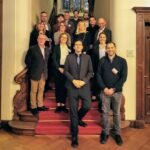Lecture and conversation | Radboud Reflects and Neurotech EU | Learning Differently through AI?
NeurotechEU and Radboud Reflects join forces to discuss the combination of Education and AI. The lecture and conversation will be held on-site in Nijmeggen. The session will be recorded and published afterwards on the NeurotechEU channels.
Venue: to be confirmed
What does AI mean for the way we learn? Will AI take over more and more of our learning, or will it actually turn us into even more efficient learning machines? Come listen to remedial educationalist Inge Molenaar and philosopher Pim Haselager and find out how we learn in an age of AI.
AI and education
AI creates both great opportunities and challenges, especially for education. It is increasingly important that pupils and students develop the skills to use, understand and control systems with AI. At the same time, AI is also changing education itself, through smart learning materials and language models like ChatGPT.
What does the fact that we can outsource more and more of our learning mean for how we learn? Is AI going to change what skills are important for learning? And what does it mean for our future knowledge generation that the internet will be increasingly full of AI-generated information?
What does learning mean?
What does it actually mean to learn? In reproducing knowledge, AI has long been better than humans. But to ask good questions, we still need curious humans for the time being.
After their lectures, Inge Molenaar and Pim Haselager will discuss AI and the way humans learn. What skills will we need (or need) in the future? Will AI take over more and more of our learning ability, or will it actually improve our ability to learn – albeit perhaps different things? To what extent will our learning ability become dependent on technology?
Come and ask your own questions too.
The programme is held in Dutch.
About the speakers
Inge Molenaar is a orthopedagogics scholar at Radboud University. She is an international expert on AI in education, especially the role of technology in learning and teaching processes, and researches the pedagogical, societal and social consequences of intelligent digital educational innovations.
Pim Haselager is a philosopher at Radboud University. His research focuses on the implications of neuroscience and AI for human self-understanding. Specifically, he focuses on technologies of Robotics, Brain-Computer Interfacing and Brain Stimulation.


